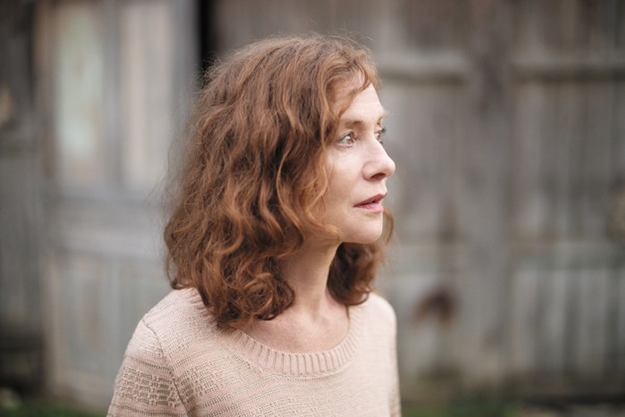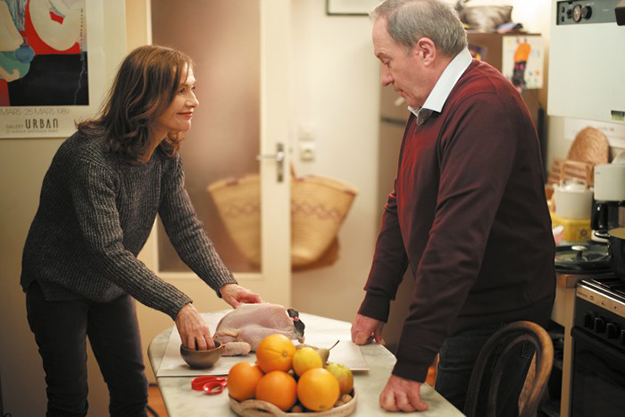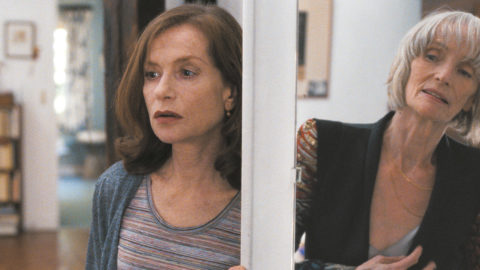Berlin Interview: Isabelle Huppert
Nathalie (Isabelle Huppert) doesn’t throw a fit when her husband of 25 years informs her that he’s seeing another woman, in Mia Hansen-Løve’s L’Avenir (Things to Come). She doesn’t cry either, nor does she smash any porcelain against the wall. She simply looks up at him and asks: “Why did you tell me that?” Played with characteristic stoicism, caustic humor, and a welcome dose of warmth by the always fantastic Huppert, it’s a telling moment in the life of a woman who refuses to collapse as her supporting pillars erode from beneath her.
Increasingly burdened by a near-senile mother (played by a striking Edith Scob) and her equally skittish cat, Nathalie remains a dedicated teacher of philosophy even amidst rising student protests in Paris. She finds comfort, stability, and endless pleasure in the world of letters and ideas. Writer-director Hansen-Løve draws on her experiences growing up with philosophy professors as parents and portrays the inner workings of academics—a world which can often feel stilted and alienating both onscreen and in real life—with a mix of admiration and lighthearted absurdism.
As Nathalie adapts to the dissolution of her marriage and her two children moving out—and on—she begins to take solace in the company of her handsome ex-student and protégé, Fabien (Eden’s Roman Kolinka). But when she joins him at his farmhouse in the hills for a visit, heady conversations reveal not only the extent to which their ideals have diverged, but also that Nathalie’s personal philosophies may have shifted over the course of her life. “I’m too old for radicalism,” she tells Fabien one day.
In a movie about the relentlessly forward motion of time, the still very young Hansen-Løve refreshingly embraces her heroine’s multiplicity here, and Huppert portrays a full spectrum of emotion to go with that—often with just a single look. FILM COMMENT sat down with the physically diminutive but enviably poised Huppert shortly after the Berlin premiere of Things to Come.

The passage of time is a very important element in Mia Hansen-Løve’s work—her last film covered 20 years or so. This film is certainly more condensed, but we start with your character in the past, when her children are still young, and from the title alone, there is a looming awareness of the future. Is it easier to approach a character when so much of her trajectory is laid out in the script?
What makes the character really rich here, beyond the time that you mention, is the multiple faces to the character. The time isn’t too extended—there’s a little bit in the beginning and a small bit at the end. Of course that brings richness to the role but more than that it’s the movement that she [Nathalie] has all through the film that takes her into so many variations of her own psyche and to so many locations. When she’s free, she wants to go to the country, she wants to travel, she obviously wants to get away from something. That provided so many opportunities to create a very complex and a very rich character.
She’s never contradictory, but just rich, multiple. Some people seem to think she’s contradictory. They’re surprised that she’s an intellectual, but she has a domestic life, which happens in everybody’s life! You know? [Laughs] She can be an intellectual, and a mother, and a wife who is abandoned by her husband. She has so many topics to deal with. The movie is really about that—the movement of life. It’s not about life being still, or frozen in time, frozen by circumstances, but on the contrary, being in constant movement. She doesn’t make herself a victim but that doesn’t mean she doesn’t feel things. It’s really a challenge to create a character like this and make her believable.
Visually, too, there’s a lot of movement in the film. Your character is often on the move, running to help her mother, or, in that first scene, pacing around her classroom as she teaches. It all feels very fluid, like you’re just moving and the camera is always ready to follow you. Did it feel that way on set?
Yes, it is very fluid. That’s really Mia’s immense talent for direction, but staging as well. The camera is constantly in movement and its constantly in movement following the character, circling around the character. It makes things so easy to act with this camera, literally wrapping itself around you, and at the perfect distance, always. She really amazed me, in that respect.

I hate to qualify directors as “female directors,” but for me this film was very palpably created by a woman. I think precisely because of the multiplicity of your character, which you mentioned. She has so many relationships and so many roles but isn’t defined by any of them, and that’s why she doesn’t fall apart when she loses everything.
Yes, as she puts it at some point, “my husband left me, my children are gone, and yet, I’ve never been so free.” She turns it into something very positive. I think the great statement of the film is that she really shows us somebody who finds inner resources in herself, rather than in others. Her salvation doesn’t come from the outside, but from the inside. Maybe because she’s a philosophy teacher, she’s able to find these answers, which makes her so strong—even if she is fragile at the same time.
Women seem like they’ve won so many battles, and they have—but I actually think that even in fiction it’s so rare just to show merely a woman not as a victim. At the same time [Nathalie] is not a warrior. She remains very human, but she doesn’t collapse either.
You’ve been in so many films at this point that it’s perhaps futile to try and draw a common thread through your characters, but there do seem to be recurring qualities. In a previous interview you used the term “winning victims,” to describe the types of women you often play, which I think is an interesting way of phrasing it. Do you seek out these types of roles or do they tend to find you?
It’s not so much that I’m drawn to these characters, but more that instinctually, I’m drawn to portray them in this way. In certain films my characters were perhaps more objective victims, but also survivors: victims to a historical or political situation.
I’ve read that Mia wrote the role specifically for you. Did you work with her at all during the writing process or was the character handed to you fully formed?
No, I don’t know at what stage she thought of me… She always told me she always had me in mind for the role, but I only saw the script when it was finished—and I loved it. Mainly I thought the dialogue was wonderful. I keep thinking that the dialogue is the most important element when you’re reading a script, more than the situations themselves, because those can really be transformed by the visual language. One thing that’s not going to be transformed is the dialogue. You know that’s going to be the same as it is on the page, and the dialogue is great.

The dialogue is great. It’s actually very funny, even if the themes are dark.
It’s sometimes very funny and I was able to bring to it a sense of self-mockery and irony and humor.
Yes! The delivery of those caustic lines is so good. I was reading another interview from a couple years back and you were explaining how you feel there’s often comedy in even your darkest roles.
In a way, yes. Even in The Piano Teacher there was comedy at some points.
Well, it’s very deadpan. Obviously nothing is comedic for the character in any given situation, but rather for the audience.
Yes. I’m sensitive to this kind of comic. Not necessarily the externalized comic. But just you know, a look, a silence. Just something whispered.
Mia loosely based the film on her parents, who were philosophy professors. As a result, that world in the film feels very authentic, and you seem completely at home as well. Did you have a familiarity with the texts your character knows so well before you came to the script or did you have to familiarize yourself with a heavy reading list?
Well, I read, but I’m not a philosopher myself. I know what it is to find some answers, or just pleasure, in reading—answers are the next step. There’s a sensual kind of pleasure in reading. I like going to bed in the evening and reading a book. It makes your imagination travel, and it can make you forget things. It brings a lot to you.

Going back to this mix of vulnerability and strength in the character, I wanted to talk about that scene where her husband tells her he’s been seeing another woman. I love how she reacts. She remains so calm and asks him why he bothered to tell her.
Yeah, and she also says to him “I thought you would love me all of your life.” I like this reaction. It’s almost a woman from another generation thinking like a little girl who believes Prince Charming. It’s very naive, and very candid, and very touching at the same time, in just one line. It’s a bit narcissistic, too. “I thought I was the Queen of your world!”
Of course you can always say she could have fought more, but I think that’s what defines her. I’m not saying all women are like this, or should be like this, but what truly defines her is that she doesn’t want to fight pre-lost battles. So she doesn’t fight, she doesn’t beg. Even with the publisher, you know? When they tell her they’re not going to renew the book, she doesn’t fight them. She has a sense of dignity. She always remains very upright always, that’s nice, I like that.
Her relationship with the student [played by Roman Kolinka] is another very important one—one which brings up things about her own past ideals and how she’s since moved on. I’m curious how you see that character, the movie sometimes seems to be making fun of the notion of idealism altogether.
Yeah, but the film also never reduces anybody to what they’re supposed to be. So in principle, the next generation is the one that’s supposed to be controlled, suspected of “lightness.” In this case it’s the contrary. [Nathalie’s] mother [Edith Scob] is obviously much more superficial than her daughter, who became this intellectual, a much more serious woman. [Mia] twists the normal patterns. In the relationship with the young people she also twists the normal pattern. One would think that the young people are the most inventive and open, but when she goes back to them in the summer, she understands that there’s a gap between herself and them.
You almost find her to be younger than they are, because they are already limited in their beliefs, in their dogmatic view of life. She is more fragile, but she’s also more open. It’s interesting because the adult is not what you expect her to be and neither are the young people. They are already kind of the bourgeois of the politically correct, convinced of what they think.
I love that she finds the Unabomber manifesto on his shelf.
[Laughs] Exactly.

The relationship to her mother is another great entry point into the complexities of her emotion. She seems so flippant about and irritated by her mother’s “ailments.” But in that scene when she’s talking to the priest after her death, it’s clear she also has a very deep love and understanding of why her mother behaved the way she did.
Yes, her mother was always in love with the same man and in a way she was never able to come to terms with that. So her mother was of an old-fashioned pattern, eternally in love with the same man. And by these few words you understand this, exactly, and that maybe this is what [Nathalie] doesn’t want to be.
Right, she’s very deliberately fashioned her life in the opposite direction.
You feel responsible for your parents, but she doesn’t hesitate to express that this responsibility can also be a burden. The mother is always disturbing her as she’s giving her courses, etc. There is no fake compassion. Of course she loves her mother, that’s not the point. The movement of life is forward, but it can’t move forward without harming, and she always needs to move. If a river flows, it doesn’t go without leaving some people behind. The movement of life takes you away from your parents, and at some point they are a burden. The movie is really deep in this way.
The mother-daughter interactions are also a great source of comedy, and the relationship is kind of reincarnated after her mother’s death through Pandora, the cat.
The cat was a very good actor, but what I really like about the cat is how much it is metaphorical. It tells so much about life—obviously it’s a representation of the mother, but not only of the mother but it’s a representation of life in itself. It’s a burden, but sometimes she still wants it. At any given moment, she wants to get rid of it, but at the moment she’s going to let it go she wants to see it. She’s like a little girl, saying “where’s my cat?” In the narration of the film, the way [Mia] uses the cat is just wonderful. It’s what you want to get rid of, it’s what you need, and it’s very heavy to carry. It’s so funny and it’s so smart.
It’s also the only thing we see her being physically affectionate with—she never embraces her husband or her children. When she loses her husband she keeps asserting that all she needs is intellectual stimulation to be happy, but she does clearly crave some kind of physical connection. Finally, at the end of the film, she’s excited to embrace her granddaughter—it’s another really great scene.
She has compassion and she’s immensely touched by the baby. But sometimes her rectitude doesn’t come without insensitively. Mia does not expect her to be perfect, or just kind all the time. She doesn’t ask her husband to stay for dinner at Christmas for example. I mean, I understand that, but she could also invite him just for the children, for the family to be united again. But that’s her way. It’s interesting because when her husband tells her he’s leaving, she doesn’t say anything. Even the next day, she prepares lunch for him. But six months later, she doesn’t care about him being alone on Christmas Eve, which I think is really interesting. She can be kind, but when it’s over, it’s over and she can have this harshness.
Sometimes you can also hurt people just by lack of sensitivity. When she’s in the hospital [after her daughter has given birth], I really like that scene. She’s so happy when the husband leaves. She says, oh my God, you know, I’m so happy he left. In the next moment her daughter falls into tears. She asks is it because of what I’ve said? Obviously the daughter falls in tears because the mother is not sensitive enough to understand that perhaps it was more difficult than she thinks for the daughter to accept the parent’s separation. I think that’s so smart how it’s done. Because it’s not an explanation, the daughter never says, “Of course you hurt me.” No, she just falls in tears and then says, give me back my baby, because that’s what’s going to give her comfort, at this moment. It’s so subtle.
Emma Myers is a regular contributor to FILM COMMENT.





